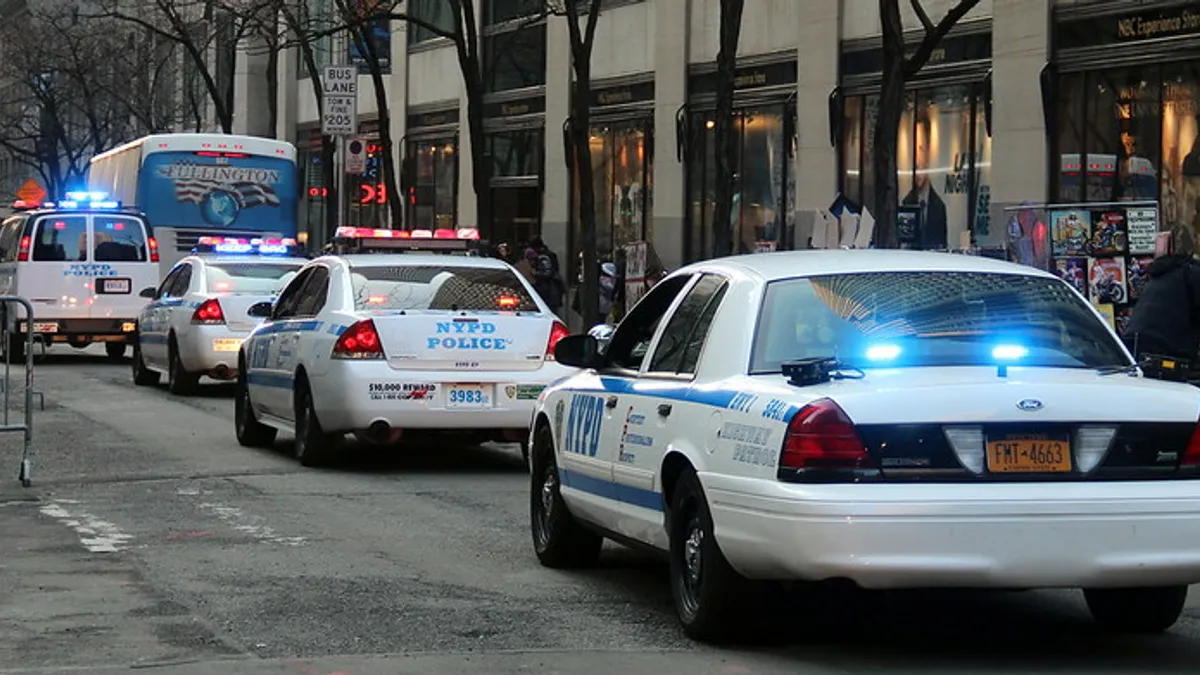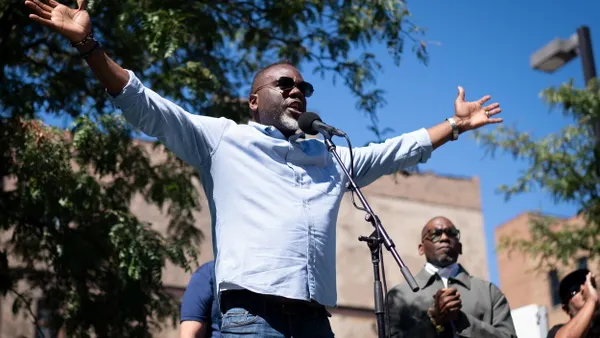Dive Brief:
- A majority of U.S. mayors acknowledge the racial disparities in how police treat residents, but are not embracing the radical changes called for in policing, according to the Menino Survey of Mayors published this week by the Boston University’s Initiative on Cities.
- The survey found that 68% of mayors believe Black people are treated worse by police compared to White people, while 69% believe the protests against police violence last summer were forces for positive change in their cities. Around 60% said police violence is a problem in their communities.
- Despite those concerns, 80% of mayors believe their police departments do a good job recruiting qualified police officers. And while 56% of mayors signaled an openness to reallocating at least "a few" police resources to other areas of city government like social services, one-third did not see the need to reallocate any resources or responsibilities, even amid calls to "defund the police." Instead, many supported smaller reforms to police departments, like increasing diversity and forming civilian review boards.
Dive Insight:
This survey of 130 mayors from 38 states was conducted in the summer of 2020, when racial justice demonstrations were at their height following the killing of George Floyd by Minneapolis police officers.
Katherine Einstein, an associate professor of political science at Boston University and a co-author of the report, said she was struck by the "inconsistencies" of mayors recognizing there are racial inequities in how residents interact with law enforcement, but saying they are happy with the size of their police departments' budgets and the people recruited to be police officers.
"We should view those findings as being at odds with each other," Einstein said.
A Smart Cities Dive analysis of municipal budgets for FY21 found cities have been largely consistent in their funding of their police departments, though slight policy shifts have been more popular, especially when presented in the form of ballot measures. Those policy tweaks have mostly included review boards and giving new authority to independent auditors.
"There's a lot of interest in these modest reforms, which are more politically achievable, relative to bigger structural reforms like reallocating a lot of money for social services, or bringing social workers onto police squads, or reallocating their responsibilities and saying that there's some mental health crises that maybe should be better addressed by other city staff," Einstein said.
Those minor tweaks, as opposed to wholesale reforms, are partly due to the power of the police unions and public opinion, neither of which favor the kinds of large-scale changes that some have called for. Minneapolis, which pledged to disband its police department, made only small cuts to its budget.
Einstein said the fact that city leaders nationwide are now prepared to have conversations about systemic racism indicates how far the debate has evolved.
"I do think we are having conversations that would have been unthinkable even five years ago," she said. "And I think mayors have become much more comfortable really explicitly talking about racism and race than they've been in the past. Obviously having a conversation is not a policy solution, but it's a necessary first step, recognizing that racial inequality is really important."
Since this survey was conducted at the height of recent police reform discourse, it's possible survey results would look very different if this were to be fielded at another time, Einstein said. And while some cities have made moves toward police reform, the issue has faded somewhat in some corners of society.
Einstein said local governments' stretched budgets due to COVID-19 could also weigh heavily on mayors, as they try to maintain existing programs rather than introduce bold new initiatives. Menino found in early December that mayors are sounding the alarm about budget cuts forced by the pandemic.
"In some ways, I think what we observed in this data is the high watermark for mayors’ willingness to tackle police reform," Einstein said. "My hunch is by next summer, if I were to field these exact questions again, we probably wouldn't actually see the sort of appetite for police reform. We'd see they're sort of even more strongly digging in on the idea of keeping things roughly as they are and engaging in more modest reforms."











